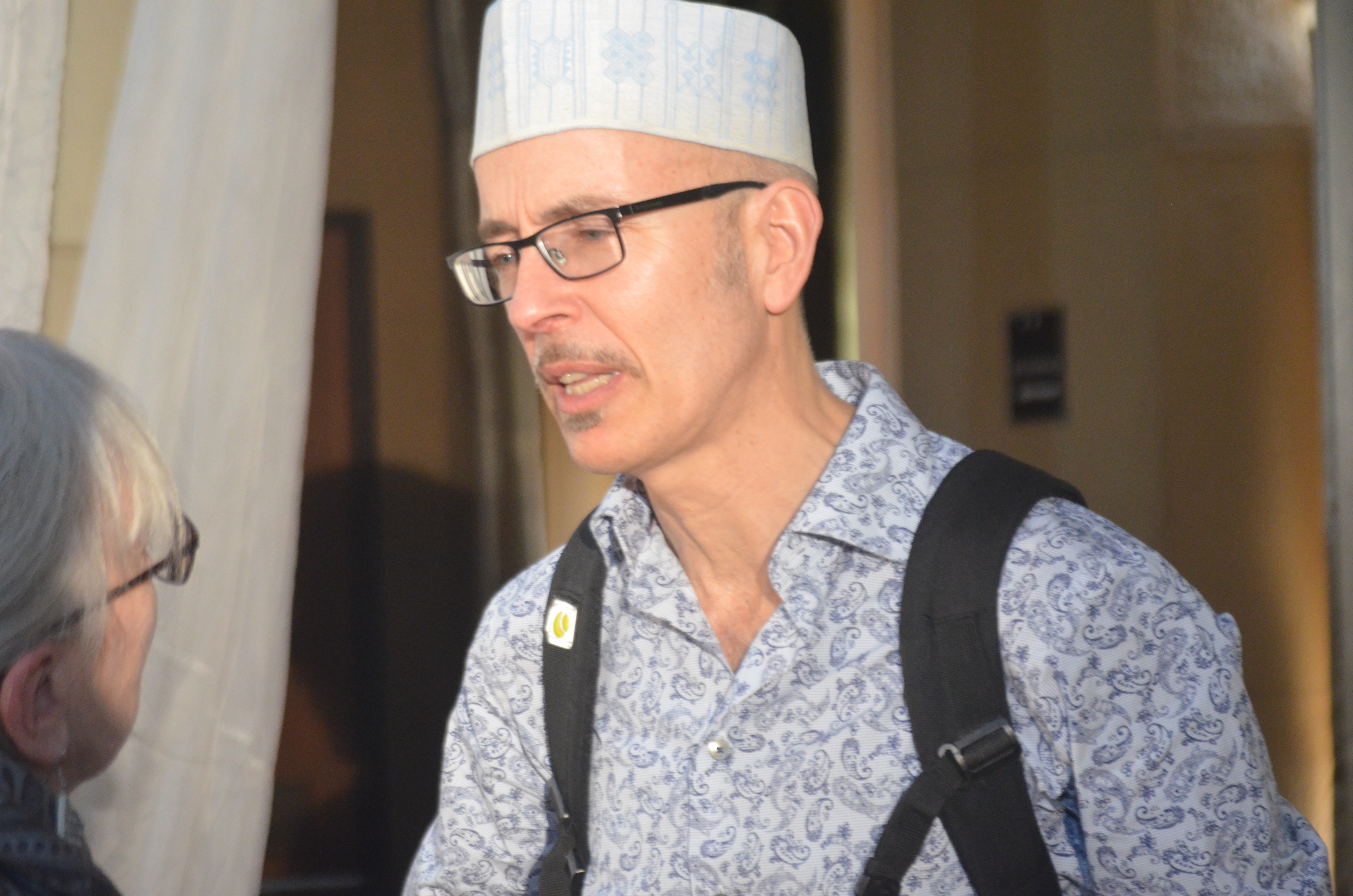Two speakers did not agree with Prof Bayo Olukoshi. They were Prof Ebere Onwudiwe and Dr. Kayode Fayemi, governor of Ekiti State. Onwudiwe argues that thematising the event in terms of the future of democracy in Nigeria implies the assumption that democracy exists already. In his words, for something to have a future, it must exist in the first place. What we have, he says, is nothing beyond periodic elections, the very opposite of anything as involving as Bjorn practicalised in his daily living. It probably makes better sense to say that Prof Onwudiwe was interrogating Prof Olukoshi only to the extent that his intervention fell within the Q & A segment. Otherwise, he was more or less hitting the framers of the theme because Olukoshi did not privilege elections as defining of democracy nor did he suggest anything of that from Bjorn. This was basically what he said in response to Onwudiwe. “I am not celebrating what exists as a finite achievement”, he said, restating his earlier position that 1999 was an important milestone, a great threshold. For him, the democratic project is a permanent work in progress.
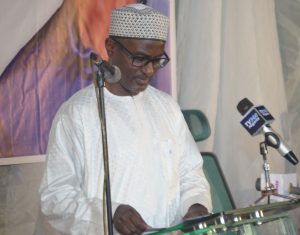
Mallam Kabir Abdullahi Yusuf, Chairman of the occasion and Publisher, Daily Trust
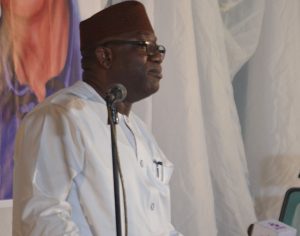
Gov Kayode Fayemi, about only one of the power elite with any radical roots at all
Dr. Kayode Fayemi who was speaking at this time turned on this to say democracy is a process that is not possible without elections and which as far as he is concerned, is improving in Nigeria. Again, he wasn’t disagreeing with Bayo as such but, more correctly, a tactical swipe at Onwudiwe. Of course, he prefaced his contribution with reckoning with Bjorn as a quintessential humanist who could disagree with anything but even then with smiles. He told the story of one such disagreement of Bjorn.
This was the nature of the conversation towards the tail end of the day and it remains to add what members of Bjorn’s family had to say for this piece to be concluded. That can, however, not come before the interesting disclosures by Mallam Kabiru Abdullahi Yusuf who served as Chairman of the occasion. Perhaps, for the first time, Mallam Kabiru clarified the well known ‘gossip’ in radical circles (at least in the North) that Bjorn criticised Daily Trust. Now and here is what actually happened, straight from the horse’s mouth and in an uncommon rendition.
Mallam Kabiru’s story is that Bjorn taught many of his generation political economy at ABU, Zaria. This came with a clear cut materialist perspective. The pronounced class antagonism in the North was and is such that many members of the generation entered the university already as angry, anti-establishment but passionate nationalists, readymade rebellious guys against those they see as exploiters. Ferrying these chaps across materialist political economy as was happening across the universities and especially in Zaria was like adding fuel to fire. It was like enabling them to analyse and fight rather than serve as reserve army for right wing backlash. The establishment understood this and soon came up with ruling class disciplinary discourses exemplified in ‘university teachers teaching what they were not paid to teach’ as an example.
The other side of this is the petit-bourgeois roots or remaking of these budding radicals by quality university education and the tension embedded in that. In other words, they are enabled to rail against system whose preservation is also important to them because of certain privileges university education has guaranteed for them in the system.
In Kabiru’s case, according to his story, by the second year at ABU, Zaria, he had become a member of the Central Committee of the Movement for Progressive Nigeria, (MPN), a decidedly Marxist front organisation for a Socialist push. But there was tension between Marxism and Western liberalism. Kabiru was particularly torn between “the grace and synthesis” provided by Bertrand Russell and the Marxian approach. This is the point Bjorn Beckman came into the story. It was Bjorn who broke Russell’s hold on Kabiru by demonstrating the superiority of the Marxian lens, occasioning a rupture that went on to acquire its own practical implications.
But even then, Kabiru’s account is that his most enduring memory of Bjorn are not related to the academic. It was Bjorn who socialized him into the culture of wearing the seat belt even within the Zaria township in Bjorn’s Volkswagen. Bjorn would respond to his protest to that effect by drawing attention to how even more dangerous than long distance drivers the local equivalents around town could be. This was similar to Comrade Issa Aremu’s experience about Beckman as the source of his socialization into the involvement of ‘the man of the house’ in cooking. Aremu eloquently spoke about this. Strangely but not surprisingly, he didn’t connect the story to the embarrassing debate on husbands’ foray into the kitchen at one of the hottest meetings of the now defunct Women in Nigeria, (WIN), the most radical gender platforms in Nigerian history. In that heated meeting, it was women who rejected the democratic premise of men sharing in cooking. It was men who supported it. If Olukoshi’s report about Bjorn’s insistence on popular agency is not to be violated, then it doesn’t stand to reason to say that the women members did not understand the issue. Of course, they did: they were protecting their only power resource in the politics of the typical household. With most women materially dependent, what would be their bargaining chip in the aftermath of the democratisation of the kitchen? Is it not interesting that the few women who supported the issue at the said meeting were those materially comfortable. Aremu didn’t make reference to this because labour, not WIN national politics, has been his forte.

Hybridity and diffusion have made it impossible to know who exercises the most control on a publisher

The Abuja Head office of Media Trust
There is a second dimension of this. Kabiru’s family house in Kano was where Bjorn used to park his Volkswagen when travelling back to Europe, with instructions to Kabiru to keep warming the car. Of course, Mallam Kabiru kept the car warmed beyond starting the engine and letting it steam. He drove it around Kano too.
He gives an insight to Bjorn who didn’t mind sharing what he called his ramshackle one room accommodation at the Usman Dan Fodio University, Sokoto where he initially berthed as an academic. On one occasion, something happened. He was expecting Bjorn to attack the petit bourgeois temptation in playing Mozart but only to find Bjorn singing along.
Then the big part of the story – Bjorn’s ambivalence about Kabiru’s foray into journalism, meaning departure from academia. Implied in that is the question of which one serves the radical agenda better: academia or journalism?
Anyway, Bjorn followed Daily Trust’s coverage of the 1999 communal violence in Kaduna which, as far as Kabiru is concerned, gave space to the gory and the ugly but also to the human sides such as Muslims saving Christians and Christians saving Muslims here and there even in the heat of it all. Bjorn was, by Kabiru’s admission, suspicious of such a copious coverage of what he considered religious revivalism by a paper with a publisher of radical roots. But he didn’t launch an attack directly. He did so through a third party who has basically the same history with Bjorn as Mallam Kabiru although he wasn’t Bjorn’s formal student. As the debate on this wore on between Kabiru and the third party, Kabiru sensed that “were he, (Bjorn) asked to judge, I would have been the loser”. The third party in question happened to be at the event and spoke later along with his better half.
Kabiru’s conclusion is that journalism is a very strange animal, partly intellectual, partly about writing the moment. “Context is vital but a systematic assessment of the past is the job of the Historian”, he stated, a distinction that will bring him more attackers than his third party friend if he put this on the table in a seminar class on post Cold War journalism. But it is a weighty conclusion to the extent that it is experientially derived. He added more things. This reporter is not sure of this line of his jottings but he said something about there being a limit to subjectivity. There, he got it 100 % if that’s what he said. Similarly, he said a newspaper can do all the great coverage but it risks irrelevance if it is not anchored on the local frame of reference. Fortunately and unfortunately, this is the same thing the International Institute of Communications discovered in its 1991 study of global news agenda, coming to the conclusion that “it seems that there are many worlds on this one earth and that mostly, they stay next door, minding their own business”.
If this is so, why is Mallam Kabiru not a visible resource person in Graduate Seminars of Department of Mass Communication across Nigerian universities? Or is he already doing this silently in the way of the aristocracy? He doesn’t need to read anything up beyond dropping one claim and the debate around it will take the rest of the two – three hours of the seminar. It must be only in Nigeria that there are all manner of resource persons with very rich experience but no relationship with knowledge production.
Kabiru’s testimony performed a role which must be to signal that the event was not one for lumpenism, (no attack intended) but one of elevated reflection. It remained so throughout with the balanced representation in terms of students, women, labour, academics, professionals and politicians, amongst others. However, trained in articulation, the intellectuals managed to dominate the show. After the symbolic Solidarity song, it was Professor Jibo Ibrahim who spoke next, another member of the closely knitted camp around Bjorn.
He too told many interesting stories from a completely different location in the Bjorn Cosmo. He was part of the students who benefitted from the radical bloom in ABU from the late 1970s into the early 1980s and could be said to be among the most well heeled in Marxist analysis in Nigeria. His is thus the story of what happened when his level of Marxism met Bjorn’s own because he was a Masters student when Bjorn came and most certainly taught him.
His rating of Bjorn is that of the most influential scholar of the era, with a huge network of students and comrades around. He credits Bjorn with record capacity for mobilising students; fighting for inclusion of peasants and powerfully inserting Marxist political economy, singling out Bjorn’s epistemological concern with a better understanding of the African condition; his insistence on taking the ruling class seriously rather than just abusing it, (the same thing Eskor Toyo said in 1981 in Kano); critically comprehending the dynamics at work and how they were/are evolving and seizing the opportunities the dynamics were presenting. The entry point was always the point about developing popular strategies, working with popular agency.
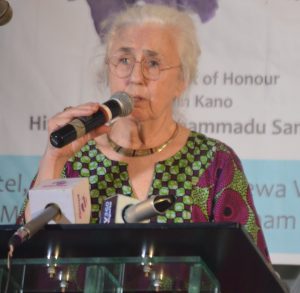
Dr. Gunilla Andrae speaking at the occasion
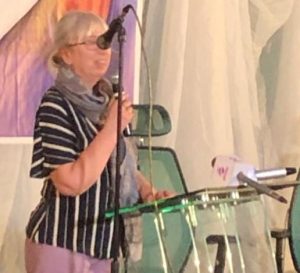
Malin, Beckman’s daughter, speaking at the occasion
Prof Ibrahim whose presentation had to be read by Alhassan Peirera Ibrahim, his son because he is nursing a leg-ache took special note of Bjorn’s key player role in the 1983 Marx and Africa Conference at ABU, categorizing Prof Yusuf Bangura’s recent treatise, Epic Battles in Radical Development Theory, Field Research and Praxis: A Celebration of Björn Beckman (1938-2019), (https://intervention.ng/18256/) as a required reading. A slightly amended version of the piece was circulated at the occasion and is due to be published in CODERIA Bulletin shortly.
The high point of Ibrahim’s presentation is the disclosure about how the onset of disease made it impossible for Bjorn to write his story of the experience. His indisposition came just around the time he was set at age 75 to get on with such task. Malin, Bjorn daughter, completed the story when she spoke eventually. Bjorn was good at taking copious notes and diaries. These were the stuff the daughter was reading to him on his sick bed which must have excited him tremendously to turn into readable texts. Some Engels would have to complete these Marx’s scripts now.
Ayuba Waba, president of the Nigeria Labour Congress, (NLC) testified to Bjorn’s impactful presence based on the references to him by his students that he, (Waba) encountered. It is the basis of his conclusion that Bjorn took his call beyond teaching and research to building consciousness among workers. He links this to the argument about the essence of politics. For him, it should be about philosophy and ideology, not aggrandizement. He sees the mismatch in Nigeria in the disconnection between ideology and politics which is what he cites as the explanation for routinisation of cross-carpeting, something that he says, is disallowed in Ghana, for instance.
Prof Ayo Dunmoye, another ex-colleague of Bjorn sent a note which was read on the floor before Prof A.D Yahya spoke. So also did Prof Ismaila Zango, former Director of the Kano based Centre for Research and Documentation, (CRD), an outfit Bjorn co-founded with about six or so others. Comrade Issa Aremu too spoke as has already been reported except to mention his point about how one northerner expelled 31 other set of northerners from ABU, Zaria a few months to their graduation in 1981. He was referring to Prof Ango Abdullahi and how only Bjorn Beckman and Claude Ake, non-northerners all, could facilitate the re-admission of these expelled northerners into different universities within and outside the country contrary to the arrangement against their possible re-admission anywhere. Some of the expelled students were Lamis Ibrahim Dikko, the late Abdulrahman Black, the late Bala Mohammed, ‘General’ Chom Bagu and Aremu himself. Aremu equally spoke about Bjorn’s book on union power in the textile industry but offered such a univocal reading of the text that it has to be a story for another day.
Prof Ebrima Sall sent in a message. He and Prof Emmanuel Akwetey were the two students of Bjorn outside Nigeria that the organisers wanted to speak at the occasion but it wasn’t possible in the end.
It was the turn of the Bjorn family to speak. Peter didn’t speak much. He confessed being immensely touched by the readiness of all to put up the occasion and what he had heard said about his father. He recalled spending three years in Ghana and how West Africa is ingrained in him although his own work has followed a different trajectory. Everything he said points a replica of Bjorn in terms of what Prof Adele Junaid earlier on called Bjorn’s “strong solidarity with the human condition in the Third World”. Reference has already been made to Malin reading Bjorn’s diaries to him on his sick bed and how important that was to him both from the point of view of professionalism and the culture of never ending conversation. Malin was sure the gathering would keep her father’s spirit alive.
Dr. Gunila Andrae, Bjorn’s wife for 60 years expressed happiness in coming for the occasion. She spoke about numerous research groups in which Bjorn was involved in back home and Sweden and whose greetings she conveyed to the gathering she rated as overwhelming.
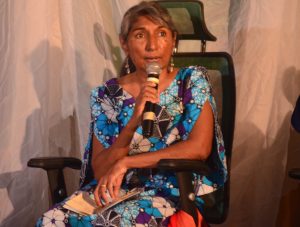
Dr Chermaine Pereira: “making connections across spaces of struggle” in the age of fragmentation!
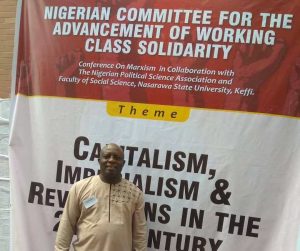
Portrait of a recent attempt at a new beginning
All said and done, what was the message in all these? One reporter cannot determine that but can guess or nominate the candidate message. And this reporter nominates Dr Chermaine’s statement about “making connections across spaces of struggle”. The rest didn’t put it in exactly the same grammar but it is the same thing Olukoshi privileged in the entirety of his submission just as it is what Adele Junaid and almost everyone else is advancing.
But, what might that mean for radical politics in Nigeria?. Can it mean any other thing than taking radical politics beyond determinism and all the rationalist Enlightenment categories that have underdeveloped Marxism in spite of its emancipatory halos? How can Socialism in terms of predetermined categories such as working class essentialism confront and defeat the status quo in Nigeria today, for instance, without “making connections across spaces of struggle” – from the cry for justice in environmentally stressed backwaters of the Niger Delta to the culturally sensitive communities across the country or the major sites of structural violence such as demonstrated by Chermaine in the case of gender or those who see the contradiction in ethnic terms?
What manner of struggle for Socialism is this that cannot speak the language of agency but still hopes to prevail? Capitalism might be the dominant contradiction but does everyone experience capitalism in the same way? Not even all members of the working class experience capitalism in a homogeneous manner. Capitalism has spaces. What, in the Nigerian situation, are each of these spaces and how might they be connected through a chain of equivalence towards a ‘common will’ that critical activists talk about?
The discourse of breaking-up Nigeria has gone on for too long that the reality may not be too far. Breaking a nation is not a difficult thing because those who want it are not interested in the practical difficulties of doing that. The demographic profile of Nigeria is such that it must not break because, as the late Reuben Ziri was used to saying, it will be easier to break water into its components than to break Nigeria. What he means is that people will suffer because it cannot be done peacefully. And Prof Olukoshi has mentioned a point that was not that mentioned before which is that there are people who cannot locate themselves in spatial, cultural, religious and linguistic terms in a different Nigeria from what exists. States such as Kaduna, Kogi, Benue, Adamawa and probably Ogun will disintegrate the next minute after the umbrella called Nigeria disappears because there is no mixing that will keep these entities intact afterwards. There are many more such spaces.
So, framing the crisis and the plausible solutions to it outside breaking – up the country is the way to go. It is a task 75% of which goes to the rapidly ageing generation of those who subscribe to radical democracy because that is the last set of Nigerians that schools passed through them. Hence the title of a recent article that eventually didn’t get published: Time to Worry When the Kole Shettimas, etc Are Turning 60. Above all, it is clear that all other alternatives to activists of radical democratic politics have no idea of how to manage the crisis or even run a functional state. The crisis of technical incompetence is an even greater threat to Nigeria than perceived identity dominance. It is that profound technical incompetence that explains the reaction time to emergencies in Nigeria, for instance. Reaction time to emergencies in Nigeria must be the worst in the world.
Unless radical democratic politics or the struggle for Socialism is reconfigured from the ontological autarky of orthodox Marxism so as to answer Iwere’s question of who leads the process of reconvening the conversation, then the worst could happen before anyone knows. This might be the sense in which Bjorn Beckman is a friend of Nigeria in that, even at death, he is still contributing to the possible remaking of Nigeria.

